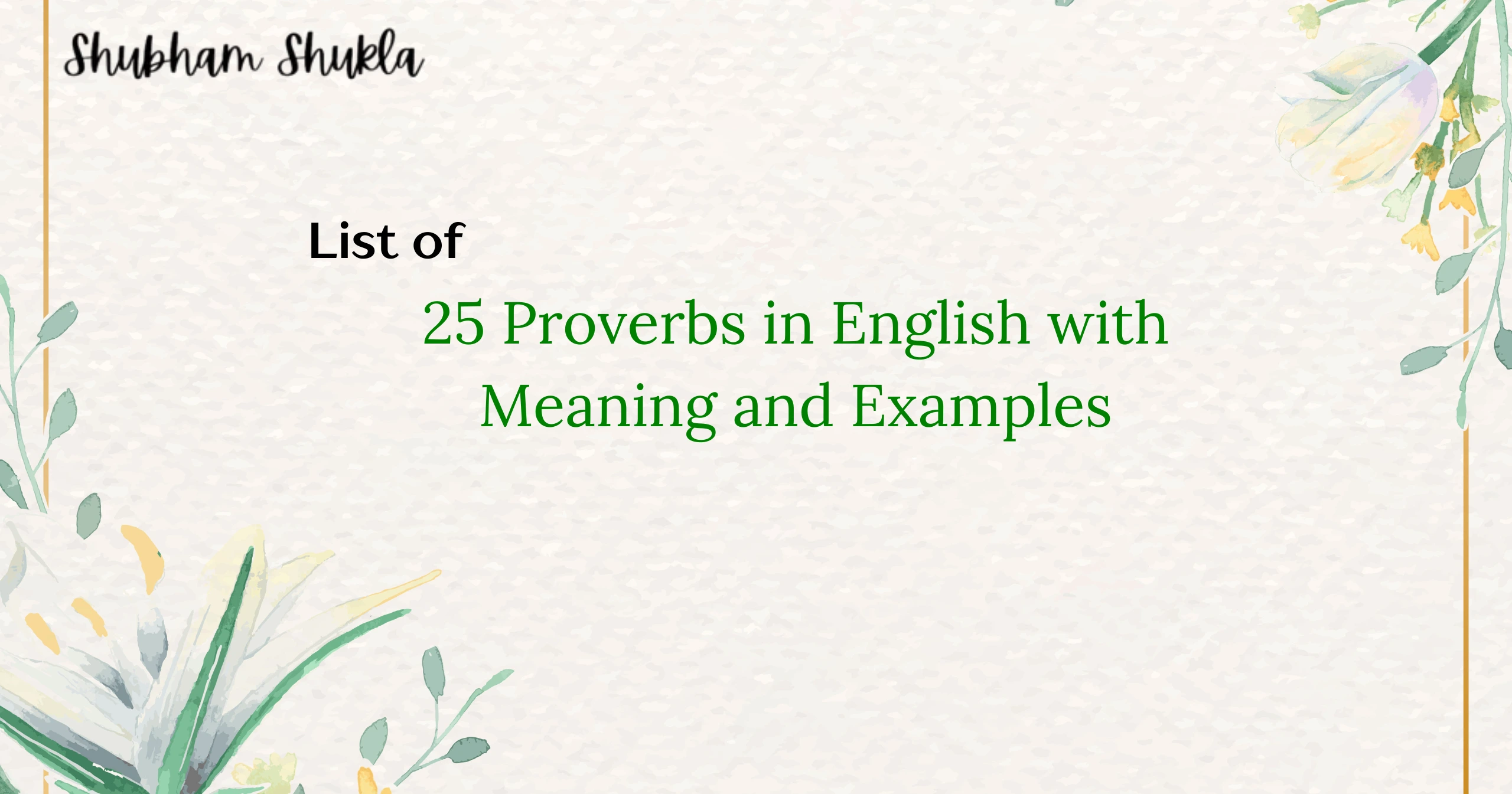Proverbs in english are more than just a collection of well-chosen phrases; they are a rich and traditional means of imparting moral lessons, giving advice, and sharing wisdom. These catchy proverbs are handed down orally from generation to generation, each one containing a priceless pearl of wisdom distilled from the combined experiences of our forefathers.
Often using metaphorical language, proverbs cut to the heart of what it means to be human, offering insights into the joys and sorrows of life, and providing practical advice on how to navigate its complexities. From the familiar to the obscure, from the ancient to the modern, proverbs can be found in nearly every culture and language, reminding us that despite our differences, we share a common bond as members of the human family.
Proverbs that have meaning are similar to little treasures in many respects, and as time goes on, their worth grows. Every time we hear one, it feels like we’re discovering a priceless treasure, honing it with our knowledge, and transferring it to new generations. Idioms and proverbs also exist in a variety of forms and sizes, from the straightforward to the intricate, the amusing to the serious, much like pearls.
Proverbs may enlighten, uplift, and inspire us whether we apply them in daily speech or come across them in writing or public speaking. They serve as a reminder that we are not alone in our difficulties and that others have overcome similar obstacles. They provide us with a road map for navigating life’s ups and downs and demonstrate that hope exists even in the most dire circumstances.
You may also read: Anecdote: Definition, Types, Uses with Examples
A list of 25 Proverbs in English Literature with Meanings and Examples is provided below:
- “Actions speak louder than words.” – Words may not always mean the same thing as actions. The famous book “To Kill a Mockingbird” by Harper Lee is one work of literature that illustrates the adage that “actions speak louder than words.”
- “All is fair in love and war.” When emotions, storyline, and conflict are present, people are free to employ any strategy to further their objectives. One literary work that exemplifies this idea is Emily Bronte’s beloved novel “Wuthering Heights.”
- “A penny saved is a penny earned.” – The value of saving money is equal to that of earning it. A literary work in English that serves as an illustration of this idea is Charles Dickens’ “David Copperfield.”
- “A stitch in time saves nine.” – When an issue is addressed early on, it can be stopped from getting worse and needing more work to correct later. The famous book “Jane Eyre” by Charlotte Bronte is one piece of literature that exemplifies this idea.
- “Don’t judge a book by its cover.” – Don’t judge someone or anything by their outward look alone. The book “To Kill a Mockingbird” by Harper Lee is one literary work that exemplifies this idea.
- “Better late than never.” – Even if anything is done after the fact, it’s still better than nothing at all. The famous book “The Great Gatsby” by F. Scott Fitzgerald is one literary work that exemplifies this idea.
- “The early bird catches the worm.” – The individual who is proactive and gets an early start to the day will succeed more. Jane Austen’s “Pride and Prejudice” is one work of literature that serves as an example of this idea.
- “A bird in the hand is worth two in the bush.” – It is better to have something worthwhile and certain than something vague and maybe unachievable. The play “Macbeth” by William Shakespeare is one literary work that illustrates this concept.
- “You can’t have your cake and eat it too.” – Two incompatible things cannot exist at the same time. Oscar Wilde’s book “The Picture of Dorian Grey” is one piece of literature that serves as an illustration of this idea.
- “Better late than never.” – Even if anything is done after the fact, it’s still better than nothing at all. The classic novel “The Great Gatsby” by F. Scott Fitzgerald is one work of literature that serves as an example of this idea.
- “Honesty is the best policy.” – Being sincere and true is preferable in every circumstance. Tom, the main character in Mark Twain’s beloved book “The Adventures of Tom Sawyer,” persuades his pals to give him their priceless belongings in return for the right to paint a fence white.
- “A bird in the hand is worth two in the bush.” – Having something valuable and certain is preferable to having something hazy and maybe unattainable. William Shakespeare’s play “Macbeth” serves as one literary example of this idea in action.
- “An apple a day keeps the doctor away.” – Illness can be avoided by eating a balanced diet and practicing self-care. The main character in the well-known children’s novel “James and the Giant Peach” by Roald Dahl finds a magical peach that enables him to go to a distant place.
- “Where there’s smoke, there’s fire.”- There’s usually some validity to rumours and signs of something. Sherlock Holmes and Dr. Watson embark on a perilous inquiry after hearing tales of a supernatural beast that stalks the Devonshire moors of Dartmoor in Arthur Conan Doyle’s well-known detective story, “The Hound of the Baskervilles.”
You may also like: Synopsis of Haunting Adeline: How This Dark Romance is Gripping America
Famous Proverbs
Well-known English proverbs are succinct, to-the-point statements that express a universal truth or a useful nugget of knowledge. These proverbs’ continuing appeal and relevance to the human experience have made them well-known and frequently cited. Several well-known proverbs in english include the following:
“Actions have consequences.” – Positive or negative, there is always a response or consequence to an action. The main character, Raskolnikov, in Fyodor Dostoevsky’s book “Crime and Punishment,” commits a murder and has to live with the consequences.
“The grass is always greener on the other side.”- When in fact, others may not have it better than they do, people frequently think this way. In Jane Austen’s beloved novel “Pride and Prejudice,” Elizabeth Bennet, the main character, first thinks Mr. Darcy is arrogant and distant while she is in love with Mr. Wickham, who is amiable and charming.
“You can’t have your cake and eat it too.” – Two incompatible things cannot exist at the same time. Oscar Wilde’s book “The Picture of Dorian Grey” is one piece of literature that serves as an illustration of this idea.
“Beggars can’t be choosers.” – When someone is in need, they have to take any assistance they can. The main character of Victor Hugo’s “Les Misérables,” Jean Valjean, is a former prisoner who is having difficulty making ends meet on the streets.
“A rolling stone gathers no moss.” – A person who is always on the go and evolving can never really amass anything in life. The main character of J.D. Salinger’s book “The Catcher in the Rye,” Holden Caulfield, is continuously on the move and searching for a sense of direction in his life.
“Curiosity killed the cat.” – Excessive curiosity may put one in risk or have unfavourable effects. Alice follows her curiosity on a number of strange and perilous excursions in Lewis Carroll’s beloved children’s novel “Alice’s Adventures in Wonderland.”
“Out of sight, out of mind.” – When something or someone is hidden from view, people have a tendency to forget about it. Hester Prynne, a character in Nathaniel Hawthorne’s book “The Scarlet Letter,” wears a scarlet letter “A” on her chest as a sign of her adultery.
“You reap what you sow.” – You will ultimately be held accountable for the things you do. The main character Edmond Dantès is wrongfully imprisoned for years in Alexandre Dumas’ book “The Count of Monte Cristo” before escaping and exacting retribution on those who wronged him.
“A rolling stone gathers no moss.” – A person who is always on the go and evolving can never really amass anything in life. Holden Caulfield, the protagonist of J.D. Salinger’s book “The Catcher in the Rye,” is a man who is always on the go and searching for a sense of direction or meaning in his life.
“A watched pot never boils.” – Anything that you’re impatiently waiting for seems to take longer. Harry Potter, in J.K. Rowling’s book “Harry Potter and the Goblet of Fire,” is looking forward to a letter from his godfather, Sirius Black, but it never gets there because it gets intercepted by someone else.
“Out of sight, out of mind.” – When something or someone is hidden from view, people have a tendency to forget about it. Hester Prynne, a character in Nathaniel Hawthorne’s book “The Scarlet Letter,” wears a scarlet letter “A” on her chest as a sign of her adultery.
“All that glitters is not gold.” – Not everything that looks wonderful or valuable is in reality. William Shakespeare’s character Portia cautions against selecting a suitor based only on appearance in “The Merchant of Venice.”
“Two heads are better than one.” – Better solutions and ideas might come from working together with others. With the aid of his friends and allies, the protagonist Frodo Baggins embarks on a treacherous quest to destroy the One Ring in J.R.R. Tolkien’s novel “The Lord of the Rings.”
“A watched pot never boils.” – Anything that you’re impatiently waiting for seems to take longer. Harry Potter, in J.K. Rowling’s book “Harry Potter and the Goblet of Fire,” is looking forward to a letter from his godfather, Sirius Black, but it never gets there because it gets intercepted by someone else.
“Time heals all wounds.” – Even the most traumatic events can eventually be overcome or forgotten given enough time. Khaled Hosseini’s book “The Kite Runner” examines the notion that “Time heals all wounds.” Amir, the main character, feels guilty and ashamed about things that happened in the past, but he eventually finds forgiveness and closure for those things.
“When in Rome, do as the Romans do.” – It’s best to observe local customs and traditions when visiting a foreign country. This aphorism is adhered to by Phileas Fogg, the main character of Jules Verne’s “Around the World in Eighty Days,” as he blends in with Indian customs and attire to blend in and not call notice to himself.
In conclusion, proverbs and idioms are effective means of imparting information in a condensed and memorable way. These brief proverbs, which have been passed down through the ages, offer a framework for decision-making and conquering challenges in life as well as insights into the human condition.
Proverbs have the power to uplift and instruct, offering practical lessons that may be applied in a range of contexts, including everyday speech, writing, and public speaking. By understanding and putting these proverbs’ lessons into practice, we can develop a greater awareness of the world around us and make wiser decisions in our day-to-day interactions.



